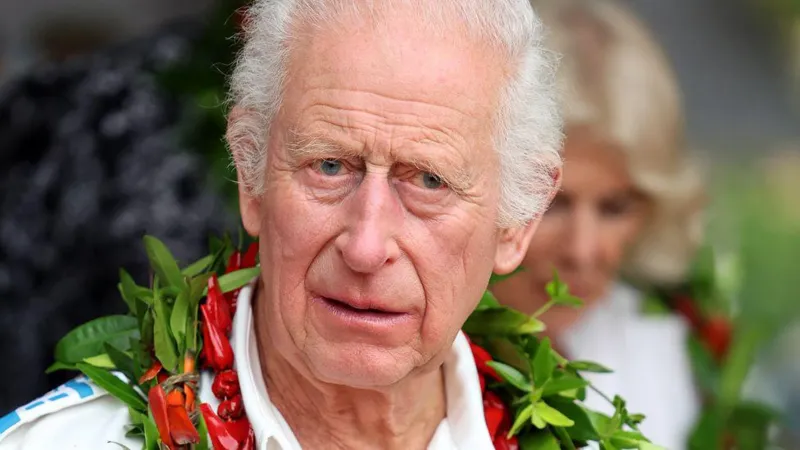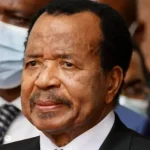The “most painful aspects of our past continue to resonate”, King Charles III said this week to Commonwealth leaders in Samoa, as arguments about reparations and apologies over the slave trade rumbled once again.
That’s become an occupational hazard for the Royal Family, as it can’t shake off questions about the long shadow of historic links to slavery.
It’s even more pointed in a forum such as the Commonwealth summit, with leaders representing some of the countries most affected by the legacy of colonialism and slavery.
But even if the King had a personal belief that there should be a symbolic apology or a commitment to reparations, he wouldn’t have been able to deliver it.
Monarchs speak on the advice of ministers – and on a question of such political sensitivity, his speeches will have to stay within the boundaries of government policy.
In other words, he has to stick to the script.
A week ago, Downing Street signalled quite clearly that there would not be an apology or a deal on reparations from the UK at the summit in Samoa.
That meant that whatever the King might privately think, anything he said about such historic wrongs would reflect the line set by the government.
“None of us can change the past,” the King said diplomatically, neatly aligning with Prime Minister Keir Starmer’s line that we “can’t change our history”.
That hasn’t stopped the King from going very close to the wire.

In Kenya last year, the King spoke of his “greatest sorrow and regret” at the wrongdoings of the colonial era.
In language stronger than in Samoa, he spoke of the “abhorrent and unjustifiable acts of violence committed against Kenyans” during their struggle for independence.
But in keeping with government policy, there was nothing that could be pinned down as an explicit apology.
The use of “sorrow” carefully avoids saying sorry. It was also used by the then-Prince Charles at the previous Commonwealth heads of government meeting in Rwanda.
Interestingly, it mirrors the closest a UK prime minister has come, when Tony Blair in 2007 formally voiced his “deep sorrow and regret” over Britain’s part in the slave trade.
At the time, there were calls for Blair to go further, but he later said he had said sorry.
Although expressing it as “sorrow” includes the emotion, it avoids the liability and expectation of compensation that might come with “sorry”.
As head of state, the King is the symbolic focus of calls for such redress, whether that’s financial reparations or some other ways addressing of historic wrongs. That’s not going to go away.
That’s awkward but he’ll take that in his stride, as it’s a political decision that he can’t change and reparations for the past seem unlikely when current UK budgets are under intense stress.
But there’s also the more complicated question of how much the monarchy, as both a family and an institution, might have a closer responsibility.
For example, the Royal African Company, founded in the 17th Century under royal patronage, has been claimed as transporting more enslaved people from Africa across the Atlantic than any other company.
But history, like people, can be full of contradictions.
When it came to Britain’s pioneering efforts to abolish slavery, in the early 19th Century, research by historian Prof Suzanne Schwarz found the Royal Family itself was divided.
The nephew of George III, the Duke of Gloucester, was one of the most important campaigners to abolish slavery – a tireless opponent of the cruel trade and a supporter of the Royal Navy’s efforts to intercept slave ships.
But before the royals feel the clouds lifting, George III’s son, the future William IV, was one of the most enthusiastic defenders of slavery.
There’s a sparkling silver service still in the possession of the Royal Collection Trust, known as the “Jamaica Service”, which was given to the future William IV by those in Jamaica who wanted to thank him for his efforts to protect the slave trade.
Before becoming King, William IV was Duke of Clarence – and Clarence House, a royal residence, is named after him.

There have been attempts in other countries to draw a line under the question of slavery.
The Dutch King delivered a formal apology, in a move co-ordinated with the country’s prime minister.
But for King Charles and other senior royals, it’s a question that continues to hang in the background, particularly when they visit a former colony or a place where the slave trade had an impact.
Prince William and Catherine’s trip to the Caribbean in 2022 was dogged by rows over whether their visit had too much of the look and feel of a colonial visit.
Any trip planners must look at traditional dancers and garlands and start having nightmares about how it might come across.
But the King, who has been walking this political tightrope for many decades, steered a careful path in Samoa.
“None of us can change the past. But we can commit, with all our hearts, to learning its lessons and to finding creative ways to right inequalities that endure,” he said.
And in a speech that was widely seen as being about the legacy of slavery – he never once actually referred to slavery at all.














